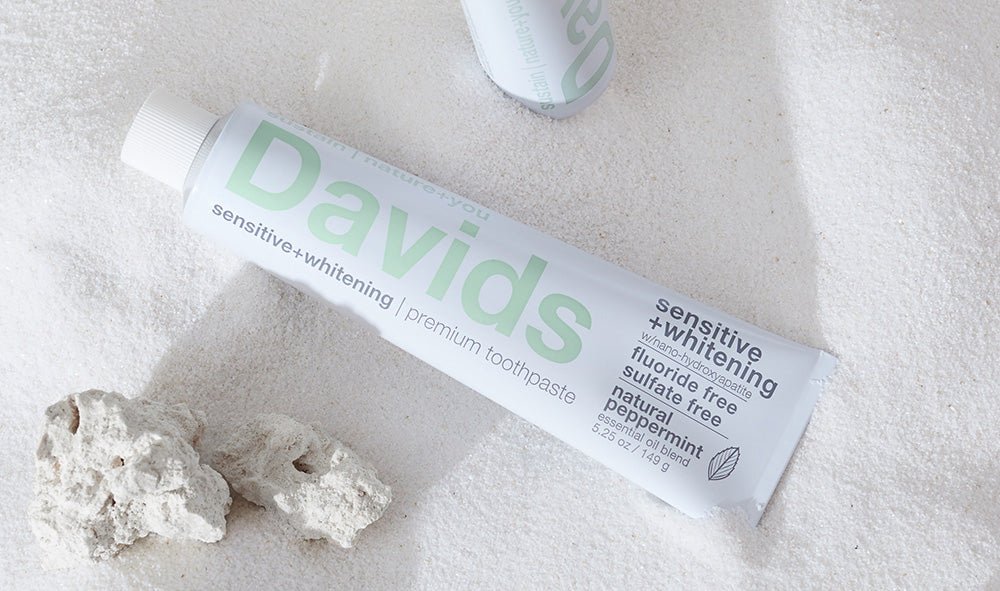Clearly, we’re very excited about nano-hydroxyapatite (n-HA).
We can’t help it, there’s a lot to be excited about! Although we’ve covered many of the benefits of this amazing ingredient in other articles, we wanted to lay them out here for easy access.
We’re also going to dig a little deeper into each of these benefits, so you can understand exactly what hydroxyapatite is doing for your teeth on a nanoscopic level.
Tiny particles, big results.
1: hydroxyapatite can effectively remineralize your teeth, arguably better than fluoride
There are several studies out there that compare hydroxyapatite to fluoride, and in every case, hydroxyapatite has proven just as effective (if not more effective) than fluoride at remineralization. You’ll find some of these studies listed below.
- Nano-hydroxyapatite and its applications in preventive, restorative and regenerative dentistry: a review of literature
- Comparative efficacy of a hydroxyapatite and a fluoride toothpaste for prevention and remineralization of dental caries in children
- Comparison of Nano-Hydroxyapatite and Sodium Fluoride Mouthrinse for Remineralization of Incipient Carious Lesions
- Enamel remineralization and repair results of Biomimetic Hydroxyapatite toothpaste on deciduous teeth: an effective option to fluoride toothpaste
Intuitively, these results make sense, and here’s why.
Hydroxyapatite already makes up roughly 97% of your tooth’s enamel (the hard outer surface) and 80% of your tooth’s dentin (the layer right below your enamel). When you brush regularly with nano-hydroxyapatite particles, they’re able to bond to your tooth and penetrate deeply because they feel “at home.” This allows the particles to remineralize your teeth from the inside out!
What does that actually mean? Nano-hydroxyapatite can effectively provide tooth sensitivity relief, prevent tooth decay, and even reverse cavities. We’ve confirmed this in our own lab studies (completed by a trusted third-party lab).
We compared Davids Sensitive + Whitening Nano-Hydroxyapatite Toothpaste with six leading competitors, two of which were sensitive toothpastes that contain fluoride: Colgate Sensitive and Sensodyne Pronamel. Davids outperformed all of the competition (including these fluoride toothpastes) by effectively remineralizing the holes and imperfections in the tooth. The results speak for themselves.

2: hydroxyapatite is safe, non-toxic, and biocompatible
As mentioned above, hydroxyapatite already naturally exists in your body. It’s biocompatible, meaning it works with the living cells in your body and does not harm them in any way. So unlike fluoride, you don’t have to worry about using or ingesting too much of it (or allowing your kids to do the same).
In addition to fluoride, a lot of conventional “sensitive” toothpastes contain potassium nitrate, which is a synthetic drug used to numb your tooth’s nerve and temporarily relieve your sensitivity. In a short time, the numbing wears off, causing you to crave the chemical drug more. It feeds this harmful cycle of absorbing / ingesting chemicals without actually addressing the root cause of the sensitivity.
Unlike fluoride and potassium nitrate, hydroxyapatite actually provides your tooth with a natural mineral supply. You see, our teeth are in a constant state of attack from acids and bad bacteria found in plaque. Nano-hydroxyapatite is a natural source of calcium, working with your saliva to restore minerals and fortify your teeth from the inside out.
3: hydroxyapatite is good for your oral microbiome
Your oral microbiome is the window to your overall health. It’s home to over 700 species of bacteria, it interacts directly with your gut microbiome, and it’s the entry point to your digestive system. Imbalances in your oral microbiome can impact your cognitive function, heart health, hormone health, immune system, digestive system, and more.
The good news? Because hydroxyapatite is biocompatible, it doesn’t contribute to any of these imbalances. In fact, it actively works to promote balance in your oral microbiome!
It does so by effectively reducing bad bacteria by binding to the proteins in plaque, removing these harmful microorganisms without depleting your mouth of good bacteria. Yes, good bacteria exist, and they’re actually essential for your oral microbiome (and body) to function properly.
Other agents like fluoride and alcohol will wipe out all of the bacteria in your microbiome, which can cause issues over time. Studies show that hydroxyapatite successfully prevents bad bacteria from attaching to the enamel, removing it without actually killing the good bacteria.
More proof that it’s an effective long-term solution.
4: hydroxyapatite can whiten your teeth (without any help)
Research shows that hydroxyapatite toothpaste can whiten your teeth without the help of any other whitening ingredients. It doesn’t accomplish this by simply “polishing” your tooth’s surface. It penetrates the enamel, replenishing minerals and repairing stains, scratches, and imperfections at the source. The result is whiter, healthier, and stronger teeth.
Add in the other whitening ingredients found in Davids such as calcium carbonate, hydrated silica, baking soda, and sodium cocoyl glutamate....and you have the perfect recipe for a pearly white smile!
5: hydroxyapatite helps your mouth maintain a healthy pH
A healthy pH is extremely important for your oral health. Every day, our teeth are subject to acid attacks from coffee, citrus fruits, sugars, and other acidic foods and drinks. When the pH of your saliva becomes too acidic for too long, it can lead to bad breath, sensitivity, inflammation, gum disease, tooth decay, and more.
Your saliva’s pH should hover between 6.2 and 7.6 (neutral / slightly alkaline), and hydroxyapatite can help it stay there. When n-HA remineralizes the enamel, it makes your teeth more resistant to acidic substances, preventing them from penetrating the enamel and causing lasting damage.
On top of this, our other neutralizing ingredients such as xylitol further prevent bacteria from sticking to your teeth and help to produce more neutral saliva to balance out the acidic saliva in your mouth.
In other words, Davids Sensitive + Whitening Nano-Hydroxyapatite Toothpaste works to protect your teeth from every angle.







